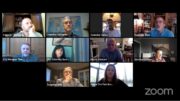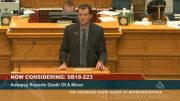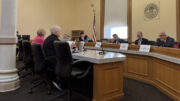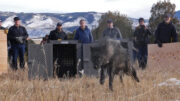By Jeffrey A. Roberts
CFOIC Executive Director
Denying a Pagosa Springs lawyer legal standing to sue a school district because he doesn’t live within its boundaries “would drastically and substantively alter the protections” of the Colorado Open Meetings Law, not only for him, “but for all persons,” the Colorado Freedom of Information Coalition and the American Civil Liberties Union of Colorado say in a court filing.
The two organizations submitted a friend-of-the-court brief last Friday in a Court of Appeals case that challenges Matt Roane’s “private attorney general” practice of suing school boards and other public bodies around Colorado for violations of the state’s open-government laws.

A district court judge in Elbert County found last October that Roane, as a Colorado citizen, “has a legally protected interest in having public bodies conduct public business openly in conformity with the provisions in the statute.” She denied a motion by the Elizabeth School District to dismiss a Roane lawsuit based on the argument that he “has no connection to the Town of Elizabeth.”
The school district immediately appealed. The district’s lawyers accuse Roane in a court brief of “taking advantage of small rural communities and school districts for alleged violations that have not impacted him at all.” In a joint filing, the Colorado Association of School Boards and the Colorado Rural Schools Alliance argue that Roane hasn’t shown he “suffered an injury in fact.”
But a provision added to the open meetings law in 2014 says that “any person denied or threatened with denial of any of the rights that are conferred on the public by (the statute) has suffered an injury in fact, and therefore, has standing to challenge the violation,” notes the CFOIC/ACLU brief, drafted by attorneys Eric Maxfield, a CFOIC board member, and Laura Moraff of the ACLU.
“Votes in all committees, House and Senate, were unanimously in favor of the clarification that ‘any person’ denied the rights of COML (Colorado Open Meetings Law) had standing to sue,” the brief adds. “The amendment reflects the view that when a meeting is wrongly closed, everyone is injured — not just those residing nearby — because everyone is deprived of information about how public bodies are doing their public business.”
Roane, in his own Court of Appeals brief, acknowledges filing 98 lawsuits against public bodies around the state as a pro se plaintiff, almost all of which allege violations of the open meetings law. He has cited Colorado case law referring to citizen-litigants such as himself as “private attorneys general, who, through the exercise of their public spirit and private resources, cause[] a public body to comply with the Open Meetings Law.”
His practice, Roane wrote, “is the only solution he has come up with that puts real teeth into the role of the ‘private attorney general.’ The approach is novel, misunderstood, and universally criticized. But it is also terribly effective.”
In the Elizabeth school district case, Roane is challenging the legality of a school board executive session held Apr. 10, 2023, contending the board failed to publicly announce the “particular matter” it intended to discuss behind closed doors, as the law requires. In his brief, Roane argues that the school district’s “failure to provide such knowledge in compliance with (the open meetings law) is precisely the type of injury in fact contemplated under the statute.”
The ”permissive” legal-standing requirements in the open meetings law “are essential to ensuring that journalists, advocates, watchdogs, public interest organizations, and members of the public can access public meetings with ease and challenge barriers when they arise,” the CFOIC/ACLU brief contends.
Making the requirements more restrictive would “impose undue burdens” on journalists who have no personal connection to a particular jurisdiction but need to report on aspects of a public body meeting there, the brief says. It would hinder researchers and watchdogs studying public bodies across the state or looking for patterns in opening meetings violations, “and anyone seeking to attend a meeting for reasons they prefer not to disclose.”
“If those who are denied the COML’s protections lack standing to sue, then public bodies lack incentive to comply with the law, and its protections are merely theoretical,” the brief argues.
CFOIC and the ACLU also raise the question of whether requiring litigants to show a specific connection to a jurisdiction and the topic of a meeting would lead some public bodies to impose barriers that “prevent or deter the public from attending.”
“They might implement ID checks and deny access to anyone whose address is more than 10 miles away. They might require all out-of-district individuals to submit a written application describing their purposes for attending the meeting. They might simply go into an unwarranted closed session any time they determined that no attendees had a legitimate interest in the meeting. Each of these measures would be a severe blow to the ideals of open government and an informed public.”
Follow the Colorado Freedom of Information Coalition on Twitter @CoFOIC. Like CFOIC’s Facebook page. Do you appreciate the information and resources provided by CFOIC? Please consider making a tax-deductible donation.




